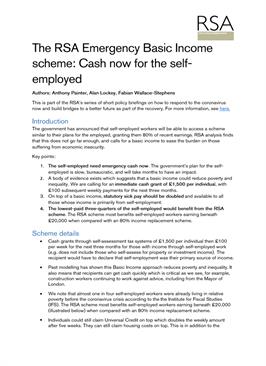This is part of the RSA’s series of short policy briefings on how to respond to the coronavirus now and build bridges to a better future as part of the recovery.
The government has announced that self-employed workers will be able to access a scheme similar to their plans for the employed, granting them 80% of recent earnings. RSA analysis finds that this does not go far enough, and calls for a basic income to ease the burden on those suffering from economic insecurity:
- The self-employed need emergency cash now. The government’s plan for the self-employed is slow, bureaucratic, and will take months to have an impact.
- A body of evidence exists which suggests that a basic income could reduce poverty and inequality. We are calling for an immediate cash grant of £1,500 per individual, with £100 subsequent weekly payments for the next three months.
- On top of a basic income, statutory sick pay should be doubled and available to all those whose income is primarily from self-employment.
- The lowest-paid three-quarters of the self-employed would benefit from the RSA scheme. The RSA scheme most benefits self-employed workers earning beneath £20,000 when compared with an 80% income replacement scheme.
pdf 904.7 KB
Contributors



Related reports
-
State of paralysis
Toby Murray Josh Priest Amy Gandon Natalie Lai Jolyon Miles-Wilson Eirini Zormpa Kimberly Bohling
State of paralysis focuses on young people’s (16-24-year-olds) economic security and what it means for their health and wellbeing.
-
Pupil Design Awards 2022-23: final evaluation report
Aidan Daly
This evaluation illustrates how the Pupil Design Awards contributes to the pupils' creative self-efficacy, awareness of real-world issues and pupil and teachers' design capability, as well as the critical factors supporting teachers to complete projects and how we can make the awards more inclusive.
-
Unleashing the potential of the UK's cities
There is huge scope for cities to add dynamism to economies, cohesiveness to communities and redemption to our environment. The long-term dividends from doing so are enormous. The question is, how it is to be done?



